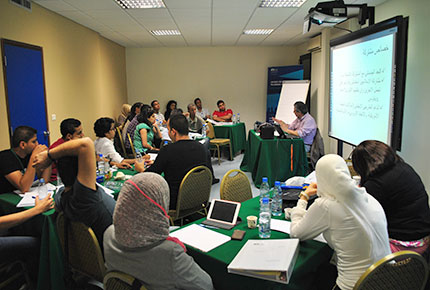Shaping regional democracy leaders
22 mid-career activists from the MENA region gather at LAU Beirut to take part in the Leaders for Democracy Fellowship Arabic Program
A formal orientation session took place at LAU Beirut on September 29, welcoming the regional participants in the Leaders for Democracy Fellowship Arabic Program coordinated by the university.
“Our fine upstanding educational institution is set to build the future not only in our beloved country Lebanon but beyond its borders as well,” declared Dr. Joseph G. Jabbra, LAU president, addressing the audience.
The 22 trainees hail from 11 countries across the Middle East and North Africa (MENA) and are set to complete a four-week academic program focused on the development of democratic institutions, as well as leadership, private action and enterprise, citizenship, diversity, and inclusion of groups in democratic states. Lectures, faculty-led simulations, self-assessment exercises and field visits are some of the pedagogical techniques the curriculum is based on.
Participants will have the opportunity to link theory with practice and extend their area of expertise through a six-week skill-building internship in a field of their choice at a governmental or non-governmental organization in Beirut.
“One of the most important things we do in the Middle East is to bring people together to learn and network in order to build a better future,” said Richard Mills Jr., U.S. embassy deputy chief of mission. “I wish I had had a year like this! So, please make the most of it,” he told the participants.
Funded by the U.S. State Department’s Middle East Partnership Initiative (MEPI) the program is subcontracted by Syracuse University, and coordinated by LAU’s University Enterprise Office (UEO) in close collaboration with the Department of Social Sciences.
“We are vigilant as to what type of democracy we want as it has to take into consideration the needs of our people and our cultural particularities,” explained UEO Director Walid Touma. “We welcome you in our home and thank the people of the United States for their support,” he added.
For 28 year-old Bahraini entrepreneur and activist Hussein Shehab, taking part in such a program is key: “I want to acquire a good working knowledge to build the capacities of influential junior fellows in the field of democracy and human rights.”
Echoing Shehab, Yemeni Thekra Ahmed al-Sabahi, 26, a trainer and civil society activist, expects to leave with a deep academic knowledge of what democracy is and allows.
“I want to learn how to become a leader,” she said before adding, “I know that as a woman it will not be easy — in our countries leadership remains the prerogative of men — but I am sure that this experience will teach me how to stand out and educate others about democracy,” she added.
The countries represented in the program are Algeria, Bahrain, Egypt, Iraq, Jordan, Lebanon, Libya, Morocco, Syria, Tunisia and Yemen.
More
Latest Stories
- Blending Coding Education With Career Exploration
- LAU Alumnus Helms Seminar on Entrepreneurship and Sustainability
- On Point Celebrates Student Innovation and Commitment to Accreditation
- LAU Kicks off the Seventh Season of the Jr. NBA League
- Bridging Policy, Science and Society to Tackle Lebanon’s Environmental Challenges
- Understanding a Core Security Gap in Drone Operations
- LAU’s AKSOB Hosts a Timely Debate on Digital Banking and the Future of Finance
- LAU Study Maps Antibiotic Resistance in Lebanese Wastewater


